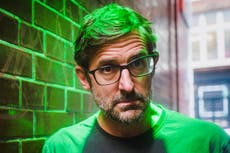John Mulaney is back in the game – but he doesn’t owe us an explanation
Since the comedian last hosted ‘Saturday Night Live’, his private life has become a tabloid fixation. It’s great if he’s able to open up about it on stage, writes Louis Chilton, but it’s not fair for audiences to demand total transparency from performers


When it comes to telling jokes, John Mulaney is a diamond. There are few comedians in the world as reliable with a punchline as he is, as assured in their delivery, as innately affable in front of an audience. Tonight, he returns as the host of Saturday Night Live, following one of the most tumultuous periods of his life. Mulaney – an unlikely candidate for tabloid sensationalism, it must be said – was hit by a wave of media attention last year, as it was revealed that he had entered rehab after relapsing with cocaine, alcohol and prescription pills. (Mulaney had been sober since early adulthood.) After leaving rehab, Mulaney faced more public scrutiny when it was reported that he was divorcing his wife, and having a baby with the actor Olivia Munn. All of this falls comfortably within the remit of his private life, otherwise known as none of anyone’s business. But it thrust him into the thick of a PR blizzard.
Mulaney has addressed the headlines during a late-night TV appearance in September and, more recently, on stage, as part of his new touring stand-up show From Scratch. His SNL spot tonight comes more than a year after his last appearance on the popular NBC sketch series, which came right before a relapse. It’s unclear exactly what he’s going to say up on the Studio 8H stage, but he’s already proven himself more than willing to crack jokes about his struggles. From Scratch features segments in which he describes his addiction and rehabilitation, at one point describing his intervention in comic detail. Despite some pig-headed criticism from some corners of the internet, Mulaney’s welcome return to the spotlight sends a positive message: that addiction isn’t something that should be stigmatised or scandalised by. It’s good to be open about it. But there’s a difference between being open about something and voicing it on a live national TV show.
Discretion is a privilege seldom granted to comedians. Such is the ostensibly confessional nature of modern stand-up, they are expected to bear themselves on stage. Old-style gag men like Rodney Dangerfield could get away without having to reveal anything about his life other than a few rote set-ups. Nowadays, comics – mainstream observationalist comics – must insert themselves into their material. If those comics are also celebrities, there is no hiding from this on stage. Pete Davidson has to tell jokes about his break-up with Ariana Grande and public. It would, perhaps, feel weird for him not address it. Dave Chappelle faced a public backlash for anti-trans jokes in his Netflix special – so he makes a point to address the backlash in his next one. But being in recovery for a drug addiction is not the same thing as surviving a bit of bad PR. It’s not an incident that can be laughed off. Sobriety is an ongoing process and a deeply personal one; no one should be obliged to share it with an audience of millions.
Of course, art can be a constructive means of processing personal trauma. Stand-up can bring catharsis for a performer; it is a means of self-analysis, self-discovery, and self-expression. Hannah Gadsby’s Emmy-winning special Nanette is one of the starkest recent examples of this – a routine that candidly discussed her own life, social issues and her relationship with stand-up comedy itself, that sought closure more than belly laughs. Many stand-ups have delivered shows centring on grief, or the death of a loved one (often, in the case of male comics, the death of a father). This trend was both parodied and embraced by the absurdist comedian John-Luke Roberts, who dressed in his late father’s oversized suit, filled with balloons, and spent a whole show impersonating him for a routine back in 2015.
However, when you talk about a comedian as big as Mulaney, there is more to it than just the art. Mulaney’s 2018 Netflix special Kid Gorgeous tipped him into the very upper echelons of the contemporary comedy scene. His was a star on the rise. The fact that he has left rehab and returned, almost immediately, to live comedy and SNL performances might attest to his diligent work ethic. But it also attests to what is expected, even demanded, of a comedian with Mulaney’s profile. People are eager for his next show; a new Netflix special can’t be far behind. This train doesn’t stop. When you’re not just in the business of stand-up, but in the business of content, is it ever possible to truly work on your own terms?
In any case, it’s a treat to have Mulaney back on TV, delivering jokes; the airwaves were greyer without him. We should remember, though, that he doesn’t owe us anything – explanations; confidences; home truths. All that matters is that he goes on stage and gets a laugh. And he always does.
‘Saturday Night Live’ airs at 11.30pm ET/8.30pm PT on 25 February. It airs in the UK on Sky Comedy the following day
Join our commenting forum
Join thought-provoking conversations, follow other Independent readers and see their replies
Comments


Bookmark popover
Removed from bookmarks